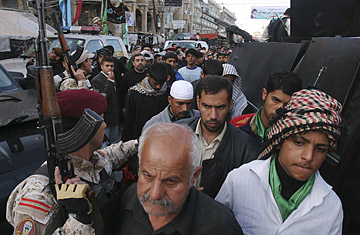
Iraqi soldiers stand guard as pilgrims walk past at the site of a suicide bombing in Karbala, Iraq, Thursday, Feb. 12, 2009.
When Shi'ite pilgrims have been killed by bombers over the past five years, nobody has had to ponder too hard on the identity of the perpetrators. After all, Iraq was in the grip of a low-key sectarian civil war, and Sunni jihadists inspired by a reading of Islam that brands Shi'ism as apostasy, had made a signature tactic of mass-casualty terror against Shi'ite civilians. That's why it's nothing short of remarkable that Karbala police Captain Alla Abbas al-Ghanimi sees this week's blast that killed Shi'ite pilgrims in the shrine city as the work not of Sunni extremists, but as a power play by one of the Shi'ite political factions battling for control of Karbala.
"My personal analysis on the situation is that the incident is political quarrels among the parties," said al-Ghanimi, a spokesman for the police in Karbala. "Someone wanted to show that the party ruling the city is not doing a very good job of keeping it safe from attacks like this, which always cause the death of innocent pilgrims." (See images of previous bombings of Shi'ite pilgrims)
Of course, the Karbala attack bore many of the hallmarks of a strike by Sunni militants, and no evidence has yet surfaced to suggest otherwise. It occurred as part of a string of similar attacks on Shi'ite worshipers throughout the country, suggesting that its motivations may not be confined to local politics. And the conspiracy theory would have to find an explanation for how Shi'ite parties could convince their own fighters to blow up Shi'ite civilians (it's not as if they could fall back on the twisted religious rationale of the Sunni extremists, whose Salafist beliefs deem Shi'ites traitors to the faith).
Still, Al-Ghanimi is not alone in speculating that intra-Shi'ite infighting has replaced sectarian conflict as the main driver of violence in Iraq today.
"The war now is a quarrel among the parties," said Ghazwan Abdul Wahid Annod, a young Shi'ite laborer in Baghdad, voicing a widely shared sentiment. "They are fighting over who gets the power."
Although a series of attacks in Baghdad and its environs have killed a number of pilgrims heading for Karbala, Iraqi security forces of the Shi'ite-led government of Prime Minister Nouri al-Maliki have done a relatively good job of protecting pilgrims south of the capital. Attacks inside Karbala are rare, because the city has tight security and many watchful eyes among the holy sites looking for outsiders who may pose a threat. The fact that Thursday's bomb attack occurred just 200 yards from the Imam Hussein shrine, the main gathering point for pilgrims and one of the most heavily guarded quarters of the city, raised suspicions among many. Al-Ghanimi said the explosive had been planted in an alley, although other reports said a suicide attacker on foot detonated a vest among a crowd. Details of the attack remain unclear, but some locals see them as pointing to an inside job by one of the Shi'ite factions vying for influence in the city.
Political tensions have certainly been high among the three main Shi'ite political factions in recent months. Moqtada al-Sadr's Mahdi Army militia, the Supreme Islamic Iraqi Council and its Badr militia, and the Dawa Party of Prime Minister Maliki compete for control of the streets in a city whose pilgrimage traffic is lucrative for local businesses. All three parties have a long history of mixing violence with politics, and they jockeyed fiercely in the Jan. 31 provincial elections. Curiously enough, Karbala's voters rebuked all three at the polls, when — according to provisional tallies — they chose Yousef Majid Al-Habboubi, an independent who trounced candidates backed by the main Shi'ite parties. The final results of the election may be released as early as Sunday, but the truth behind Thursday's bomb attack may never be known — although the willingness of many in Karbala to blame the attack on the Shi'ite political forces reveals just how weary, and wary, the citizenry has grown of the power struggle.
— With reporting by Khuder Abbas / Najaf
